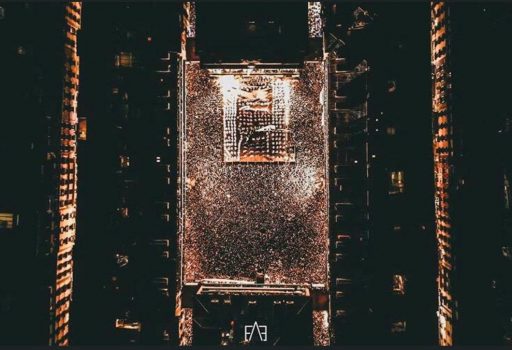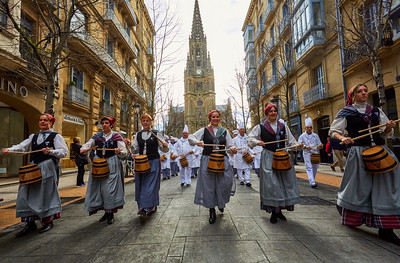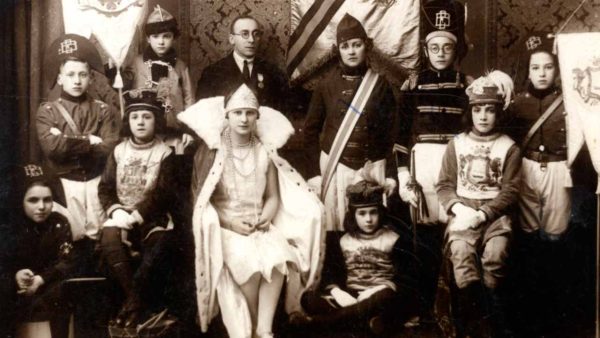Tamborrada

Categories:
Tag/s:
All the cities in the world have their day of holiday and Donosti could not be less. And obviously, in a city called San Sebastian, the main holiday coincides with the day of Saint Sebastian, our patron saint. This very special day is the 20th of January, it’s a holiday that lasts only 24 hours, from midnight to midnight, and it’s commonly called Tamborrada.
OUR HOLIDAY
And why this name? Because we spend those 24 hours playing the drums (drum means tambor in Spanish). That day old and young donostiarras go out in our tamborradas (drum companies) to celebrate and make a lot of noise. In total 19,000 adults and 8,800 children go around the different neighbourhoods in the city dressed as soldiers from napoleonic times or cooks and water carriers.
We don’t go out all at the same time, of course. The 151 adult tamborradas and the 50 children’s ones spread out during the 24 hours of the day so that there is drumming sound at all times around the city. And even if each adult tamborrada has its own route, this is not the case of the children’s tamborrada, since most of the children’s tamborradas go out all together the 20th of January in the morning, being the start of the parade at midday.

The official holiday, anyway, starts a lot earlier, more specifically the midnight from the 19th to the 20th, when a lot of us go to the Constitution Square. There, at midnight exactly, Gaztelubide, one of the most veteran tamborradas, plays for the first time in a year the March of San Sebastian, our anthem, at the same time that the mayor raises the city flag. It’s a very emotional moment, a favourite for a lot of donostiarras, as it’s the beginning of the best day of the year. And so, for 24 hours, the drumming noise doesn’t stop all around Donosti, until at night, we go again to the most known as La Consti. There the Unión Artesana, the oldest tamborrada, plays one last time the March while the mayor lowers the city flag and the holiday ends until the next year.
Despite the name of the holiday, in the Tamborrada the barrel is also played, which is like a wooden drum. The usual thing, in fact, is that soldiers play the drum, and that cooks and water carriers play the barrel. And why is that? You may ask. Because the soldiers represent the French that occupied Donosti from 1808 to 1813, and the cooks and water carriers represent the donostiarras of the time, that went to the water fountains at the same time the French did the changing of the guard accompanied by drums, it was when the donostiarras mocked them by beating their barrels as a response.
ORIGINS
Even though the holiday doesn’t come from the French occupation, as it starts years after the 1813 fire, with time has evolved to what it is nowadays. And what in the beginning was just a pre-Carnival before the official one weeks later, nowadays it’s a holiday in it’s own right.
So if you visit Donosti on such an important date, enjoy it! Do as we do and follow tamborradas singing and dancing the songs composed by Raimundo Sarriegui, come to La Consti to the izada or arriada, eat and drink and make a lot of noise!

Festara! Dantzara!
And like all festivals, this one also has a hymn.
| Bagera!
gu ere bai gu beti pozez, beti alai! Sebastian bat bada zeruan Donosti bat bakarra munduan hura da santua ta hau da herria horra zer den gure Donostia! Irutxuloko, Gaztelupeko Joxemaritar zahar eta gazte Joxemaritar zahar eta gazte kalerik kale danborra joaz umore ona zabaltzen hor dijoaz Joxemari! Gaurtandik gerora penak zokora Festara! Dantzara! Donostiarrei oihu egitera gatoz pozaldiz! Inauteriak datoz! Bagera! gu ere bai gu beti pozez, beti alai! |
Here we are!
also we we’re always happy, always cheerful! Sebastian there is one in heaven Donosti just one in the world he is the saint and this is the town There it is our Donostia! From Irutxulo, from Gaztelupe Joxemaritar old and young Joxemaritar old and young from street to street playing the drum There they go spreading out good humour Joxemari! From now on sorrows to the corner To the party! To the dance! We come to shout to the donostiarras happy! Carnival is coming! Here we are! also we we’re always happy, always cheerful! |